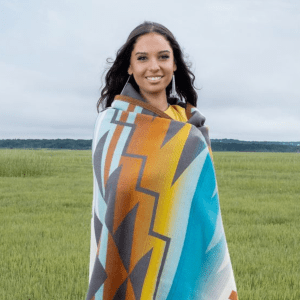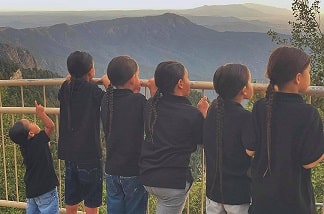American Indian College Fund Offers Three-Year American Indian Law School Scholarship to Attend Harvard Law School
Applications Close March 25, 2024
Denver, Colo.—February 7, 2024– A law degree is foundational for Native leaders to ensure the rights of their sovereign Nations and citizens. Law school graduates work as lawyers, in public policy, government, law enforcement, education, and more. Thanks to a $1 million gift from an anonymous donor, the American Indian College Fund is awarding its third American Indian Law School Scholarship for a student entering Harvard Law School in the fall of 2024.
The scholarship covers tuition and all costs of attendance for an American Indian or Alaska Native law student enrolled in Harvard Law School’s three-year course of study. The scholarship goal is to eliminate financial hurdles to earning a Juris Doctor degree at Harvard Law School. Applications are open to American Indian or Alaska Natives who are enrolled tribal members or lineal descendants of an enrolled parent or grandparent.

Samantha Maltais
Samantha Maltais, an enrolled member of the Wampanoag Tribe of Gay Head/Aquinnah located on Martha’s Vineyard, Massachusetts, is the current scholarship recipient. An American Indian College Fund student ambassador and a 2018 Dartmouth College graduate, Maltais was an American Indian College Fund Full Circle Scholar throughout her academic career. She will be the first Wampanoag tribal citizen to graduate from Harvard Law School this spring.
Maltais’s Native Nation is intimately tied to Harvard University. The Harvard charter of 1650 stipulated the College’s commitment to ‘educate the English and Indian youth of this country.’ The first Native American student at Harvard was Caleb Cheeshahteaumuck, a member of the Wampanoag tribe, who graduated in 1665. While the university’s original intent in welcoming Indigenous students was to assimilate them into what it then deemed “civilized” society, its focus has shifted to accepting Native students as they are and to recognizing the contributions of Indigenous peoples to American culture and higher education.
Maltais is Co-President of the Native American Law Students Association. She worked as an article editor for the Harvard Environmental Law Review and in research assistant roles for projects related to tribal land acquisition, tribal constitutions, and the newest edition of Cohen’s Handbook of Federal Indian law.
She was also a Cravath International Legal Fellow for her work in Aoteoroa/New Zealand on the environmental benefits of Indigenous self-determination rights under the United Nations Declaration on the Rights of Indigenous Peoples, and a T.A. Barron Fellow for public interest environmental law for her work as a summer law clerk at the Native American Rights Fund. She held additional law clerk positions at the Department of Justice – Environment and Natural Resources Division and the White House Council on Environmental Quality through Harvard’s Environmental Law and Policy Clinic. In the fall of 2023, Maltais was an adjunct lecturer in legal studies at Brandeis University, teaching a class on Indigenous rights, environmental justice, and Indian law. After graduation, she plans to serve as a judicial law clerk for the Ninth Circuit Court of Appeals.
As Samantha prepares to begin her legal career, the College Fund will select the next American Indian Law Scholar to begin their journey. The American Indian Law School scholarship application will close on March 25, 2024, to select the scholar in alignment with the Harvard Law School acceptance announcement. Interested students should complete the application at https://webportalapp.com/webform/americanindianlawscholarship.
About the American Indian College Fund— The American Indian College Fund has been the nation’s largest charity supporting Native higher education for 34 years. The College Fund believes “Education is the answer” and provided $17.4 million in scholarships and other direct student support to American Indian students in 2022-23. Since its founding in 1989 the College Fund has provided more than $319 million in scholarships, programs, community, and tribal college support. The College Fund also supports a variety of academic and support programs at the nation’s 35 accredited tribal colleges and universities, which are located on or near Indian reservations, ensuring students have the tools to graduate and succeed in their careers. The College Fund consistently receives top ratings from independent charity evaluators and is one of the nation’s top 100 charities named to the Better Business Bureau’s Wise Giving Alliance. For more information about the American Indian College Fund, please visit www.collegefund.org.
Journalists—The American Indian College Fund does not use the acronym AICF. On second reference, please use the College Fund.









